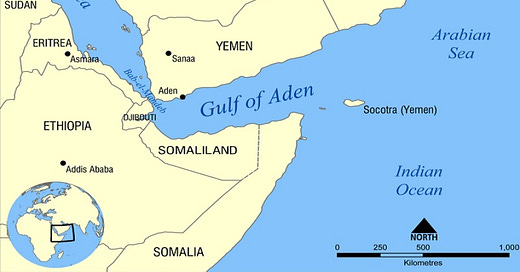Far from tacitly approving of the Houthis’ attacks as a form of hybrid war punishment against the EU for its sanctions policy and/or out of solidarity with Palestine, Russia condemned them at the UNSC as irresponsible and destabilizing.
The Houthis’ maritime attacks that have disrupted shipping across the Red Sea and are expected to entail economic costs for European countries have been popularly perceived by members of the Mainstream Media and non-Mainstream Media communities alike as allegedly being done with Russia’s blessing. The first suggests that the Kremlin wants to punish the EU for its sanctions via proxy means the second claims that this is being done out of solidarity with Palestine. Russia just proved both of them wrong.
Permanent Representative to the UN Vasily Nebenzia had this to say on Wednesday:
“We strongly condemn attacks on civilian vessels that jeopardize not only the freedom and safety of navigation but also the lives and health of seafarers. Moreover, they create additional risks and increase instability in the region that is already ‘ablaze’.
In that connection, Russia supported the Security Council's press statement on this topic adopted on December 1.
We call on the leadership of the Ansar Allah movement to cease any actions that could create threats for commercial vessels and their crews in the Red Sea and the Gulf of Aden, exercise restraint and demonstrate responsible behavior. The movement should respect the principles of safety of navigation.”
Far from supporting the Houthis, Russia condemns their irresponsible and destabilizing attacks.
Just last week, Foreign Minister Sergey Lavrov discredited the other similarly popular but nevertheless false narrative spread by many among both aforementioned media camps suggesting that his country is against Israel after he compared its latest conflict with Hamas to his country’s special operation. That top diplomat’s words were analyzed here, the article of which also included a list of nearly two dozen relevant pieces. Taken together, the trend is that Russia is clarifying false perceptions about its policies.
Truth be told, it’s been doing this the entire time, but its officials’ words about their country’s stance towards Gaza and the Red Sea were largely ignored by both media camps, each in pursuit of their own ideologically driven narrative interests. They both present it as a threat to Israel and the West, but the Mainstream Media portrays this in a negative light while many among the non-Mainstream Media community portray it in a positive one. In reality, Russia is neither anti-Israeli nor pro-Houthi.
The first part of its policy was clarified in the previously hyperlinked analysis about Lavrov’s comparison between those two conflicts while Nebenzia’s words represent the latest clarification about its position towards that Yemeni rebel group. Before that, Russia approved the UNSC press statement that he mentioned in his speech and which was also hyperlinked into the cited text above, while before that, it diplomatically withdrew from Sanaa in 2017 and condemned the Houthis’ Saudi strikes in 2018.
Other examples exist in support of the claim that Russia isn’t pro-Houthi despite what both media camps claim for their own self-interested reasons, but those two are some of the most prominent and perfectly complement what Nebenzia just said. Regarding the first, it shows that Russia came to believe that the Houthis wouldn’t adequately protect its diplomats, while the second shows that it regards this group as a force of regional instability.
That said, Russia also doesn’t consider them to be terrorists and favors their participation in the political process aimed at resolving this complex interconnected domestic-international conflict through a series of mutual compromises, all of which are premised on the view that they’re a legitimate group. It would therefore be inaccurate to claim that Russia’s criticisms of the Houthis mean that it’s against that group, but rather that it simply has a balanced approach towards them unlike what both media camps claim.
It was imperative for Russia to clarify its position yet again amidst the US-led militarization of the Red Sea that’s occurring in response to the Houthis’ attacks, the latter of which Nebenzia described as being partially motivated by the Arabs’ anger at what Israel is doing to the Palestinians in Gaza. Explaining these roots of rage isn’t the same as endorsing them, however, though the Mainstream and non-Mainstream Media communities alike will probably spin his insight for that purpose.
In any case, the point is that the latest Israeli-Hamas war is spilling over into the Gulf of Aden-Red Sea (GARS) region due to the Houthis’ solidarity with the Palestinians, and this is in turn creating the pretext for the US to lead militarization processes there that could result in another round of war in Yemen. Other goals could also be pursued too such as supporting a preferred side in the Sudanese Civil War and/or intimidating some of the Horn countries as part of its hegemonic agenda.
To be sure, the US could do all three – fuel another round of war in Yemen, support a preferred side in the Sudanese Civil War, and intimidate some of the Horn countries – without the Houthis’ pretext, but their maritime attacks conveniently serve to justify its presence there in pursuit of those possible goals. Russia is very concerned about this and wants to reverse the GARS region’s slide into war, hence why it’s calling on the Houthis to stop their attacks in order for them not to provide cover for more US meddling.





Another de facto illustration of the Russian regime's complicity in the ongoing second Nakba